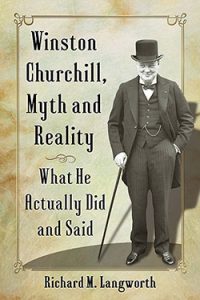Announcing “Winston Churchill, Myth and Reality”
Winston Churchill, Myth and Reality: What He Actually Did and Said is now available in paperback and Kindle formats from Amazon. Excerpts from my remarks the Hillsdale College Churchill Conference, 20 February 2017. Videos are online for all presentations.
Myth and Reality
Not a day passes when Winston Churchill, who proved indispensable when liberty hung in the balance, is not accused of something dreadful. Charges range from alcoholism and racism to misogyny and warmongering. Frequently there is no documentation, only partial quotes selected to advance preconceived notions and canards. Winston Churchill: Myth and Reality, confronts this busy industry.
Frequently critics set up Churchill as the savior of 1940, then tear him down with a familiar litany of myth. There is his self-centeredness; a penchant for chemical warfare or carpet bombing; the rude things he said about Hindus or Jews; his disdain for the uncivilized, meaning anyone other than card-carrying Englishmen.
Personal and Political
The myths are both personal and political. The personal includes charges that he was a school dunce, a failure in his marriage, avid for conflict. There are the side-claims about his parents: Lord Randolph died of syphilis; Lady Randolph slept with 200 men, brother Jack was not Lord Randolph’s son.
Policy critiques range from what he did—like defending Antwerp and attacking the Dardanelles—to what he didn’t do—not bombing Auschwitz, not feeding occupied Europe, not stopping the Bengal famine in 1943.
Where do people get these notions? The scholar Harry Jaffa said it stems from a public appetite for books and articles
which denigrate the nobility or idealism” of the causes for which the Great Democracies have fought. Young people are led to believe that to succeed in politics is to prove oneself a clever or lucky scoundrel. The detraction of the great has become a passion for those who cannot suffer greatness, to a skewed vision of the egalitarian principle, the theory that there are no great figures, we are all the same.
***
Churchill was not infallible, and it diminishes him to treat him as superhuman. In fifty years of political prominence, mistakes were inevitable. On some topics in my book, accomplished scholars have catalogued Churchill’s failings. I take note of them, along with certain less-well-known exculpatory facts. None detract from his greatness.
Churchill published fifteen million words and left an archive of a million documents: easy pickings for anyone determined to expose his alleged faults by selective editing. Yet that same archive offers the complete context. You have only to do your homework. I have done it. There is no missing context.
Things to Know about Churchill
The first thing to know about Churchill is that there is more to him than 1940. Martin Gilbert, his biographer from 1968 to 2012, wrote:
As I open file after file of Churchill’s archive, from his entry into Government in 1905 to his retirement in 1955, I am continually surprised by the truth of his assertions, the modernity of his thought, the originality of his mind, the constructiveness of his proposals, his humanity, and, most remarkable of all, his foresight.
The “macro-Churchill” thought deeply about the nature of humanity and its institutions. The “micro-Churchill” helped to solve intractable problems. In 1921, he helped negotiate Irish independence. Michael Collins, the IRA revolutionary with whom he negotiated, said: “Tell Winston we could never have done anything without him.”
In Cairo around the same time, Churchill helped draw the boundaries of today’s Middle East—an act some say we should not thank him for. Yet he established a stable Jordan, which is there yet, and confirmed Britain’s commitment to a Jewish national home, which is also there. Churchill even wanted a Kurdish homeland, “to protect the Kurds,” as he said, “from some future bully in Iraq.”
Cases for the Defense
In the 1930s Churchill opposed self-government for India, and lost. Then he told Gandhi: “Use the powers that are offered, and make the thing a success.” Gandhi, who had known Churchill since 1906, replied: “I have got a good recollection from when he was in the Colonial Office,” Gandhi said. “I have held the opinion that I can always rely on his sympathy and goodwill.”
As a young reformer, Churchill campaigned for a “minimum standard” guaranteed by the state. He called socialism “the philosophy of failure, the creed of ignorance, the gospel of envy.” He strove to help the needy but not to dislocate the system providing the help. “Churchill’s writings and speeches are full of reflections and philosophy that offer food for thought,” wrote the historian Paul Addison. “It is rare to discover in the archives the reflections of a politician on the nature of man.”
Future posts will contain excerpts from the book.
Some people think of these myths as “settled knowledge.”
They mean: all the knowledge they think you need, settled by everyone who agrees with them.








One thought on “Announcing “Winston Churchill, Myth and Reality””
I look forward to reading it!
Comments are closed.